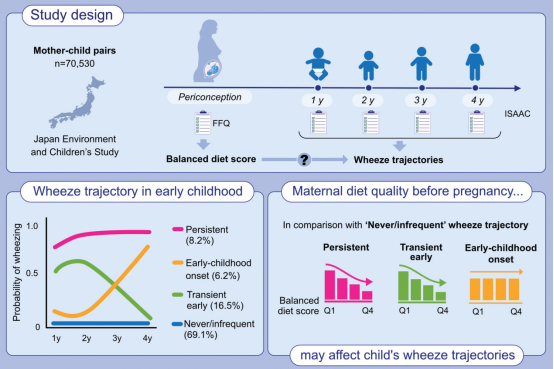Release date:2023-10-25

Allergy
[IF:14.71]
Periconceptional maternal diet quality and offspring wheeze trajectories: Japan Environment and Children's StudyDOI: 10.1111/all.15916
Abstract:
Background:The role of prenatal diet on childhood wheezing and subsequent risk of asthma is inconclusive, which may be partly due to the heterogeneity in wheezing phenotypes. We aimed to identify wheeze trajectories in early childhood and to examine their associations with periconceptional maternal diet quality.
Methods:Data from 70,530 mother–child pairs of liveborn singletons from the Japan Environment and Children's Study were analysed. Wheezing was reported by caregivers using a modified International Study of Asthma and Allergies in Childhood questionnaire yearly from 1 to 4 years of age, from which trajectories were derived using group-based trajectory modelling. Maternal diet in the year preceding the first trimester of pregnancy was assessed using a validated food frequency questionnaire; overall diet quality was determined using the balanced diet score based on the Japanese Food Guide Spinning Top. Bayesian inference of multinomial logistic regression models was performed to examine the association between maternal diet quality and wheeze trajectory in early childhood.
Results:We identified four wheeze trajectories: ‘never/infrequent’ (69.1%; reference group), ‘early-childhood onset’ (6.2%), ‘transient early’ (16.5%) and ‘persistent’ (8.2%). After adjustment for confounders, a higher quartile of maternal balanced diet score was associated with a lower risk of belonging to the ‘transient early’ and ‘persistent’ wheeze trajectories compared with the ‘never/infrequent’ wheeze trajectory by 10% of both. Maternal balanced diet score was not associated with belonging to the ‘early-childhood onset’ wheeze trajectory.
Conclusion:Improving maternal diet quality prior to conception may reduce certain wheeze phenotypes in early childhood.
First Author:
Hitomi Okubo
Corresponding author:
Shoji F. Nakayama
Correspondence:
Japan Environment and Children's Study Programme Office, National Institute for Environmental Studies, 16-2 Onogawa, Tsukuba, Ibaraki 305-8506, Japan.
Email: fabre@nies.go.jp
 杭州浙大迪迅生物基因工程有限公司
杭州浙大迪迅生物基因工程有限公司
